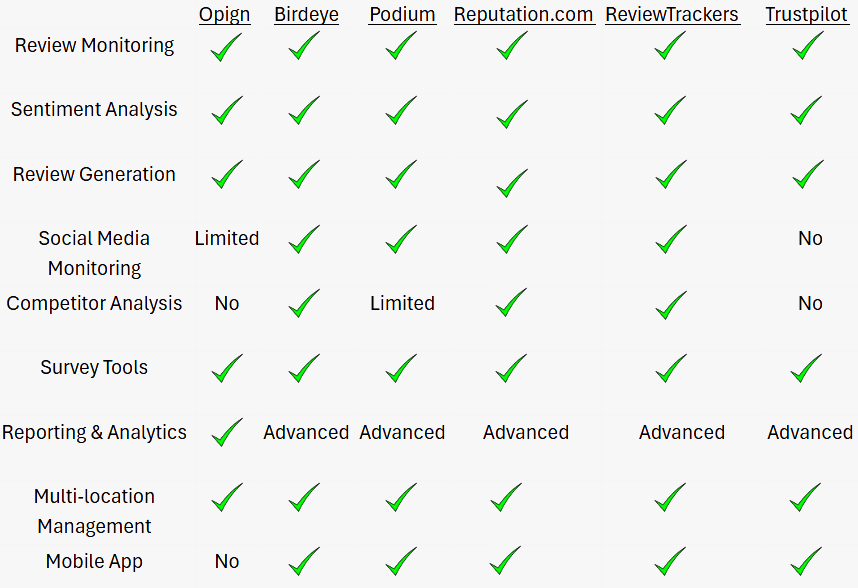In today’s digital age, managing your online reputation is crucial for businesses of all sizes. With numerous review sites, social media platforms, and other online channels where customers can share their experiences, it’s essential to have a robust reputation management strategy in place. One emerging player in this space is Opign, but how does it stack up against the top established reputation management software solutions? Let’s take an in-depth look at how Opign compares to industry leaders.
What is Opign?
Opign is a reputation management platform designed to help businesses monitor and improve their online presence. It offers features like review monitoring, sentiment analysis, and review generation to help companies build a positive reputation online.
Top 5 Reputation Management Software Solutions
To provide context for our comparison, let’s first identify five of the leading reputation management software solutions currently on the market:
1. Birdeye
2. Podium
3. Reputation.com
4. ReviewTrackers
5. Trustpilot
These platforms are widely recognized as industry leaders, offering comprehensive suites of tools for managing online reputations. Now, let’s see how Opign compares across key features and capabilities.
Feature Comparison
To get a clear picture of how Opign stacks up, we’ll compare its features to those offered by the top 5 solutions:

As we can see, Opign offers many of the core features found in top reputation management platforms. However, it appears to lag behind in some areas like social media monitoring, competitor analysis, and mobile access. Let’s dive deeper into how Opign compares in key areas:
Review Monitoring and Management
Like the industry leaders, Opign provides robust review monitoring capabilities across major platforms like Google, Facebook, and industry-specific sites. It aggregates reviews into a central dashboard, allowing businesses to easily track and respond to customer feedback.
Where Opign differentiates itself is in its focus on simplicity and ease of use. While platforms like Birdeye and Reputation.com offer more advanced features, Opign aims to provide a streamlined experience that’s accessible to businesses of all sizes.
Sentiment Analysis
Opign utilizes AI-powered sentiment analysis to help businesses understand the overall tone of their reviews and customer feedback. This is on par with what’s offered by top solutions, though some like Birdeye and Reputation.com may provide more granular analysis and trend tracking over time.
Review Generation
Opign offers tools to help businesses generate more reviews, including customizable review request templates and automated follow-ups. This is a standard feature among top reputation management platforms. However, industry leaders like Podium and Birdeye may offer more advanced automation and integration capabilities for review generation campaigns.
Reporting and Analytics
While Opign provides reporting and analytics features, the depth and customization options appear to be more limited compared to enterprise-grade solutions like Reputation.com and ReviewTrackers. Businesses looking for highly detailed analytics and custom reporting may find more robust options with the top-tier platforms.
Pricing Comparison
Cost is often a key factor in choosing reputation management software. Here’s how Opign’s pricing compares to the industry leaders:

Opign positions itself as a more affordable option compared to some of the enterprise-focused solutions. This pricing strategy may make it attractive to small and medium-sized businesses looking for core reputation management features without breaking the bank.
Unique Selling Points
While Opign may not have all the advanced features of top enterprise solutions, it does have some unique selling points:
1. Simplicity: Opign emphasizes ease of use, making it accessible for businesses without dedicated IT resources.
2. Affordability: With a lower starting price point, Opign may be more attainable for smaller businesses.
3. Focus on Core Features: By concentrating on essential reputation management tools, Opign avoids feature bloat that can overwhelm some users.
4. Customer Service: As a smaller company, Opign may be able to offer more personalized support compared to larger enterprises.
Use Case Scenarios
To better understand how Opign compares in real-world applications, let’s consider a few use case scenarios:
Small Local Business:
For a small local business like a restaurant or retail shop, Opign’s core features and affordable pricing could be ideal. The simple interface and focus on essential tools like review monitoring and generation would likely meet their needs without overwhelming them with complex features.
Multi-Location Franchise:
A growing franchise with multiple locations might find Opign suitable in the early stages, but could outgrow its capabilities as they scale. More advanced solutions like Birdeye or Reputation.com might be better suited for managing a large number of locations and handling complex reporting needs.
Enterprise Corporation:
Large enterprises with extensive brand management needs would likely find Opign too limited. These organizations typically require the advanced features, integrations, and customization options offered by top-tier solutions like Reputation.com or ReviewTrackers.
Conclusion
Opign emerges as a solid option in the reputation management software market, particularly for small to medium-sized businesses looking for core features at an affordable price point. While it may not have all the bells and whistles of enterprise-grade solutions, its focus on simplicity and essential tools makes it an attractive choice for many businesses.
However, companies with more complex needs, multiple locations, or requiring advanced analytics and integrations may find the top-tier solutions like Birdeye, Podium, or Reputation.com more suitable. As with any software decision, it’s crucial to carefully evaluate your specific needs and budget constraints when choosing a reputation management platform.
Ultimately, Opign represents a welcome addition to the market, offering a streamlined alternative to more complex platforms. As the company continues to evolve, it will be interesting to see how it develops its feature set to compete with the established industry leaders.
As always, if you found this article helpful please subscribe to our blog and/or share this post. Thanks!
References:
1. Opign. (n.d.). Retrieved from https://opign.review/
2. Taylor Marketing Gurus. (n.d.). Opign. Retrieved from https://taylormarketinggurus.com/opign
3. Birdeye. (n.d.). Reputation Management Software. Retrieved from https://birdeye.com/
4. Podium. (n.d.). Customer Interaction Management Platform. Retrieved from https://www.podium.com/
5. Reputation.com. (n.d.). Online Reputation Management. Retrieved from https://www.reputation.com/
6. ReviewTrackers. (n.d.). Customer Feedback Software. Retrieved from https://www.reviewtrackers.com/
7. Trustpilot. (n.d.). Business Solutions. Retrieved from https://business.trustpilot.com/
8. G2. (n.d.). Best Reputation Management Software. Retrieved from https://www.g2.com/categories/reputation-management
9. Capterra. (n.d.). Reputation Management Software. Retrieved from https://www.capterra.com/reputation-management-software/
10. Software Advice. (n.d.). Reputation Management Software. Retrieved from https://www.softwareadvice.com/reputation-management/




